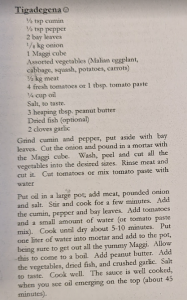Fulfulde/Fula/Peul/Pulaar/Fulani
Speaking Exercise: Bargaining
Money and Bargaining in the Maasina
Bargaining is an important part of life in the Maasina; prices you see at the market are not fixed, and especially if you are foreign, the prices you will be quoted will likely be 2-3 times higher than the price a Malian might pay. Bargaining is also a lot of fun; you should be expressive while you bargain, and it can be a great way to form relationships with particular vendors.
Counting money is not straightforward in Fulfulde; the term for “money” (ceede) refers to cowry shells which were used as currency (and is still used today to mean “change” or “coins”). French colonization shifted the currency from ceede to the 5 franc coin, called buuɗi. The system evolved such that the practice of counting money and providing prices happens in multiples of five.
For example, if someone says that an item costs “buuɗi joyi,” that translates to “Five 5-franc coins”, or 5×5, so 25 cfa (cfa stands for Communauté Financière Africaine, the currency used in Mali). If the price is “buuɗi noogaay,” it means it costs 100 cfa (5×20).
Generally, after buuɗi sapo (50 cfa), most speakers will drop the “buuɗi.” They will also use Bambara words to indicate certain multiples of 10 (debe for 40, or 200cfa, mali-hemre for 70 or 350 cfa, etc).
Speaking practice
Read the following dialogue with your conversation partner; first read Tim’s lines, then swap and read Penda’s. The dialogue is on the first page; the translation immediately follows, but do not look at it until you have completed the vocabulary exercise below.
Now, using the Fulfulde – English – French lexicon (or another dictionary of your choice), find the following vocabulary words from the dialogue (including prices – remember the base 5!).
Additional Practice
Now that you have a broader range of market vocabulary, have a conversation with your language partner about the cost of different goods. Make a list of ingredients for a favorite (simple) recipe, and then talk to your language partner about how much each of those items might cost. Finally, role play a scenario with them in which they are the vendor and you are trying to buy what you need for your dinner.
Below is a sample recipe for tigadegena (peanut sauce), should you need inspiration!


